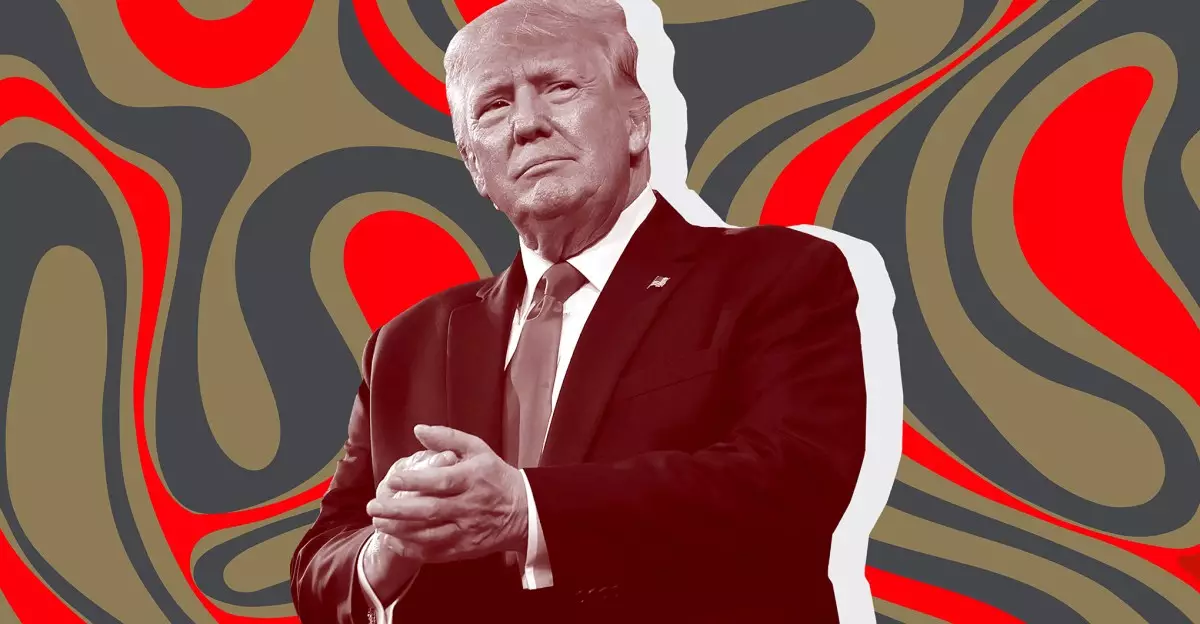In a surprising twist that blends the worlds of cryptocurrency and politics, the $TRUMP coin has found itself at the forefront of financial speculation, intrigue, and ethical questions. Just days prior to an exclusive dinner announced for the top holders of this controversial meme coin, its market value surged dramatically by $100 million, raising eyebrows across the political spectrum. This sudden uptick in value is not merely a financial statistic; it underscores a deeper narrative about the intertwining of political influence and emerging technologies in today’s society.
The timing of the announcement was curious, as it came suspiciously close to Trump’s previous remarks expressing a commitment to crypto enthusiasts. The dinner, which is set to host the 220 largest holders of $TRUMP coin, embodies a unique yet contentious form of courting financial support. The ultimate allure for the top 25 holders includes not just a casual meeting with Trump but also an exclusive tour of the White House, creating an elite club for those who can afford to stake their claim in the $TRUMP coin.
Ethical Concerns and Public Backlash
As with any controversial move from the former president, reactions have been polarizing. Democratic Senators, led by Chris Murphy, have characterized this initiative as a potentially corrupt practice—an instance where presidential power is leveraged for personal financial gain. Murphy’s remarks on social media encapsulated the feelings of many: “the most brazenly corrupt thing a President has ever done.” The idea that holding cryptocurrency can serve as a pathway to presidential access raises fundamental questions about the ethics of political practices in an era dominated by financial networks.
Senators Elizabeth Warren and Adam Schiff have further implored the U.S. Office of Ethics to scrutinize Trump’s actions, highlighting the fears of “pay-to-play” corruption. This situation sparks a broader conversation about the implications of introducing financial stakes into political interactions. As the dinner approaches, concerns mount over whether this practice could become normalized, eroding the already thin line that distinguishes governmental integrity from financial exploitation.
Investigating the Layers of Influence
Despite the firestorm of criticism, the likelihood of a thorough investigation appears dim. Republican control of Congress provides a protective barrier for Trump, which complicates the calls for accountability. The recent dismissal of the director of the Office of Ethics, who was seen as a direct threat to Trump’s operations, serves as a reminder of the significant walls surrounding the political elite. This dismissal raises questions about the governance of ethical standards in political practices, particularly as the digital age continues to blur conventional boundaries.
The allure of crypto has been significant for Trump, both as a branding tool and a fundraising mechanism. The relationship between the crypto community and Trump’s campaign reveals an intricate web of mutual benefits; while crypto enthusiasts gain access to political power, Trump receives substantial financial backing. As he publicly embraces the crypto sector, appointing a “crypto czar” like David Sacks, the strategic intent becomes apparent: Trump is positioning himself as a champion of the financial revolution, one who has the potential to reshape economic policies to favor digital currencies.
The Broader Implications of Cryptocurrency in Politics
The convergence of cryptocurrency with political machinations holds both promise and peril. While digital currencies can democratize access to financial resources, they also possess the potential to exacerbate discrepancies in political capital. The dinner with Trump highlights an unsettling reality—the more money you pour into a specific asset, the closer you sit to political power.
This burgeoning relationship between cryptocurrencies and politics forces us to reconsider the dynamics of access and influence. Are we witnessing the legitimization of financial elitism within politics? As the conversation continues, the emergence of stricter regulations seems increasingly necessary to prevent the exploitation of governmental structures for personal gain.
The discussion surrounding Trump’s $TRUMP coin is only beginning, and as it unfolds, it will undoubtedly challenge our understanding of political ethics, financial allegiances, and the role of emerging technologies in shaping our democratic landscape. While some may see this as a mere financial fad, the implications veer into the territory of ethical responsibility, demanding that we grapple with the question of who truly holds the power in an evolving political economy.


Leave a Reply